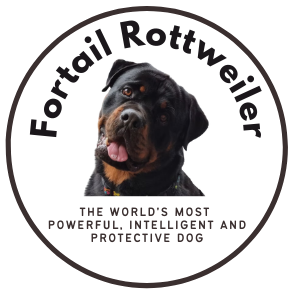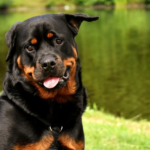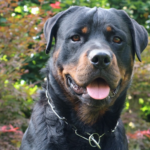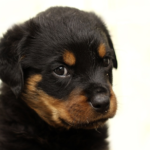At six months old, your Rottweiler is reaching an important stage in their development. It’s crucial to start basic training and socialization as early as possible to ensure they grow into well-behaved and well-adjusted adult dogs. Basic commands such as “sit,” “stay,” and “come” should be taught, as well as proper leash manners.
In addition to training, socialization is just as important. Expose your Rottweiler to different people, animals, and environments to help them become comfortable and confident in a variety of situations. This will make them a more well-rounded and happy dog in the long run.
Managing Destructive Behavior
At six months old, your Rottweiler may begin to exhibit destructive behavior such as chewing or digging. This is a normal part of puppyhood and can be managed through proper training and providing appropriate outlets for their energy.
Provide your Rottweiler with plenty of chew toys and bones to keep them occupied, and establish a daily routine for exercise and playtime. Consistency and patience is key when dealing with destructive behavior. With time and effort, your Rottweiler will learn what is and isn’t acceptable behavior.
Separation Anxiety
Separation anxiety can be a common issue among Rottweilers, especially at six months old. This behavior can manifest in many ways, such as excessive barking, whining, or even destructive behavior.
To help ease separation anxiety, gradually acclimate your Rottweiler to being alone by starting with short periods of time and gradually increasing the duration. Provide them with a comfortable and safe space, such as a crate, when you’re away. Positive reinforcement techniques, such as giving them a treat or favorite toy, can also help to alleviate anxiety.
Potty Training
Potty training is an important task that needs to be addressed when your Rottweiler is six months old. Consistency is key when potty training, so establish a regular schedule for meals and bathroom breaks.
Positive reinforcement, such as praising your Rottweiler and giving them a treat when they go potty outside, can help speed up the process. It’s also important to watch for signs that your Rottweiler needs to go, such as circling or whining, and take them out immediately. With patience and persistence, your Rottweiler will be fully potty trained in no time.
Weight and Development
At six months old, your Rottweiler is reaching an important stage in their development. They have likely reached about half of their adult weight and are continuing to grow at a rapid pace. It’s important to monitor their weight to ensure they are on track for healthy growth.
A good rule of thumb is that your Rottweiler should have a waist and you should be able to feel their ribs without having to press hard. If you notice that your Rottweiler is underweight or overweight, consult your vet for advice on how to adjust their diet and exercise.
Feeding Recommendations
To support your Rottweiler’s growth, it is important to provide them with a nutritionally balanced diet. Your Rottweiler should be fed a diet that is high in protein and fat, and low in carbohydrates.
A high-quality dry dog food is a good choice for your six-month-old Rottweiler. You can also supplement their diet with fresh fruits and vegetables, but be sure to consult your vet to ensure that these foods are safe for your dog.
It’s also important to monitor the amount of food you are giving your Rottweiler. Overfeeding can lead to obesity and health problems. Your vet can help you determine the appropriate portion size for your Rottweiler based on its weight and activity level.
Conclusion
In conclusion, six months is a crucial stage in your Rottweiler’s development, and it’s important to pay attention to their behavior, weight, and nutrition. By providing proper training, socialization, and outlets for their energy, you can help your Rottweiler grow into a well-behaved and well-adjusted adult dog.
It’s important to monitor your Rottweiler’s weight to ensure they are on track for healthy growth. A nutritionally balanced diet, high in protein and fat, and low in carbohydrates, can support your Rottweiler’s growth and development. Be mindful of food allergies, and if you notice any symptoms, consult your vet. Homemade food can be a good option, but make sure to consult your vet to ensure that the diet is nutritionally balanced and complete.
It’s important to remember that every dog is different and you should work closely with your vet to determine what is best for your Rottweiler, taking into account their individual needs and circumstances. With proper care and attention, your Rottweiler will grow into a happy and healthy adult dog.







